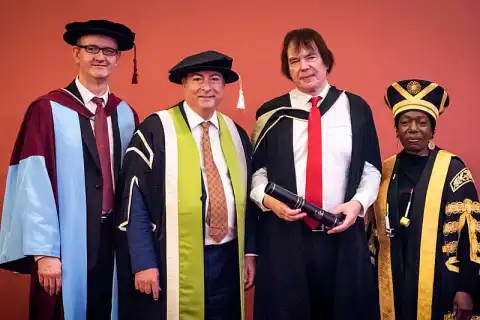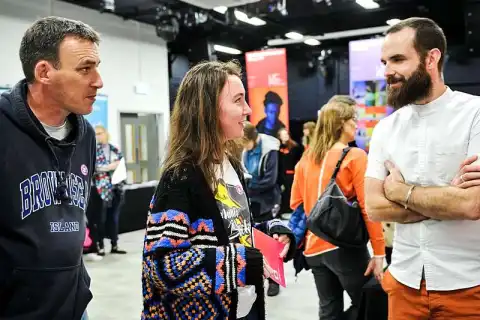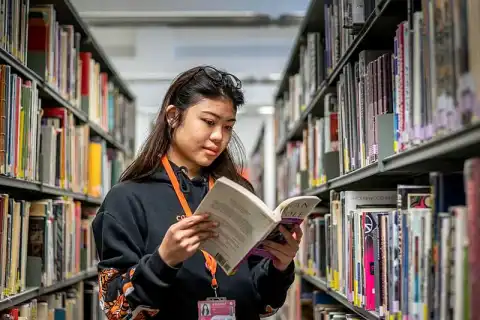Master of Arts - Fine Art (Farnham)
- 1 year
- Duration
- 18,000 GBP
- Price
- Rolling admission
- Start
- Rolling admission
- Deadline
- Master
- Degree
- Campus
- Format
- Farnham / United Kingdom
- Location
Program description
Are you willing to explore the boundaries of what constitutes fine art practise by asking probing, critical, enthused questions? Join us on our MA Fine Art course at UCA Farnham to do all of this and advance your own work.
Fine artists who want to review their current work and research are welcome to enrol in our course.
You should constantly improve your visual and mental understanding by critically analysing both your own work and that of others. After that, you'll create and polish a research topic that will eventually become either a theoretically- or a practically-driven inquiry.
A group of teaching professionals, including curators, theorists, and professional artists, will lead you and actively promote you and your work in the outside world.
With a variety of top-notch facilities, such as a bronze foundry, printmaking studios, metals, wood, and casting resources, UCA Farnham is famous for its world-class research. For both full-time and part-time students, we offer specialised studio spaces, and committed technical staff is available to support specific projects and provide introductions to workshop topics.
Program structure
Term one
- Critical Perspectives
You will investigate the significance of modern practise and working methods with students from the MFA Photography programme through a series of lectures, debates in seminar sessions, and written pieces.
Together, you will gain knowledge of the variety of theoretical and critical discussions that have had a considerable impact on current practise. You'll think about the materials you use and how they could fit in a larger cultural framework in addition to understanding how these relate to political and social circumstances.
- Research and Practice
With the assistance of your tutors, you will draught a first study proposal. You must give a clear framework for this investigation, which will be reviewed, discussed, and modified as the unit goes, even though experimentation and open inquiry are welcomed. This will guarantee that the topics of current crucial discussions stay the focus of your investigation. In order to develop and evolve as an artist, you'll also discover the finest ways to present your work to the public.
Term two
- Professional Practice and Negotiated Study
You can establish focus and choose an area of inquiry to focus on by carefully dissecting and analysing your practise from Term 1. From this point on, you will start to organise an independent project that will serve as the basis for your final major project in the following term.
It will be up to you to plan every part of the project, from conception to execution to choosing an independent, artist-run gallery in London or the South-east to host the exhibition.
Term three
You'll use the knowledge you learn through your research to produce a final body of work in the third term of the course.
- Final Major Project
Your Final Major Project, which builds on your Independent Project and serves as the culmination of your studies during the semester, should reflect your identity as a researcher as well as an artist. As you develop your practise, you'll take ownership of and excel in a particular field of inquiry, from concept and theory to practise and public presentation, and beyond.
Price
Fee for two semesters (1 year) is 18,000 GBP for international students
We have offer a range of scholarships and fee discounts.
Requirements for applicants
If you do not have qualifications from the United Kingdom, we will accept equivalent qualifications from your native country for admittance into our programs.
In addition to academic credentials, some of our courses require a portfolio of previous work.
For our Master's courses, we usually require that you have successful completion of your Bachelor's degree or equivalent from a recognised university.
English Language requirements for MA/MSc & MBA courses:
- IELTS UKVI or Academic - Listening 5.5, Reading 5.5, Speaking 5.5, Writing 5.5, Total 6.5
- Test of English as Foreign Language (TOEFL) iBT - Listening 17, Reading 18, Speaking 20, Writing 17, Total 90
- Pearson Test of English (Academic) - Listening 59, Reading 59, Speaking 59, Writing 59, Total 59
- Cambridge English Advanced (CAE) or Cambridge English Proficiency - Listening 162, Reading 162, Speaking 162, Writing 162, Total 176
- Trinity College London Integrated Skills in English (ISE) - Listening Pass, Reading Pass, Speaking Pass, Writing Pass, Total ISE III
- LanguageCert International ESOL SELT - Listening 38, Reading 38, Speaking 38, Writing 38, Total B2 Communicator High Pass
Portfolio requirements
We'll need to examine your written or graphic portfolio for these courses in order to review it. Once you've applied, we'll send you an invitation to submit your portfolio via your applicant portal; more details will be given at that time. This can also be arranged for you if you would prefer to evaluate your work with the Academic Team in person while on campus.
About the university

The UCA team firmly believes that creativity enhances the vitality, innovation, and humanity of global communities. That is why the university has been a fervent supporter of creative research and teaching for the past 160 years.
Architecture, crafts, fashion, graphic design, illustration, fine art, photography, film, media, the performing arts, and creative business are among areas of study offered by the university. Employers in the creative sector hold a high regard for this programs because of their excellent teaching standards.
We want to inspire people to use their creativity to drive change, overcome challenges and improve the lives of others.
So we’ve designed our university to be an inclusive, dynamic environment. Our campuses across Surrey and Kent, our Institute for Creative Innovation in Xiamen, China, and our homes within partner organisations such as the Maidstone Television Studios all have one thing in common: they are places to forge inspiring partnerships, make work with purpose and build real solutions to human problems across the globe – whether that’s as part of our vibrant teaching and research community, or as a student on one of our courses.
Read more about University for the Creative Arts (UCA), United Kingdom





